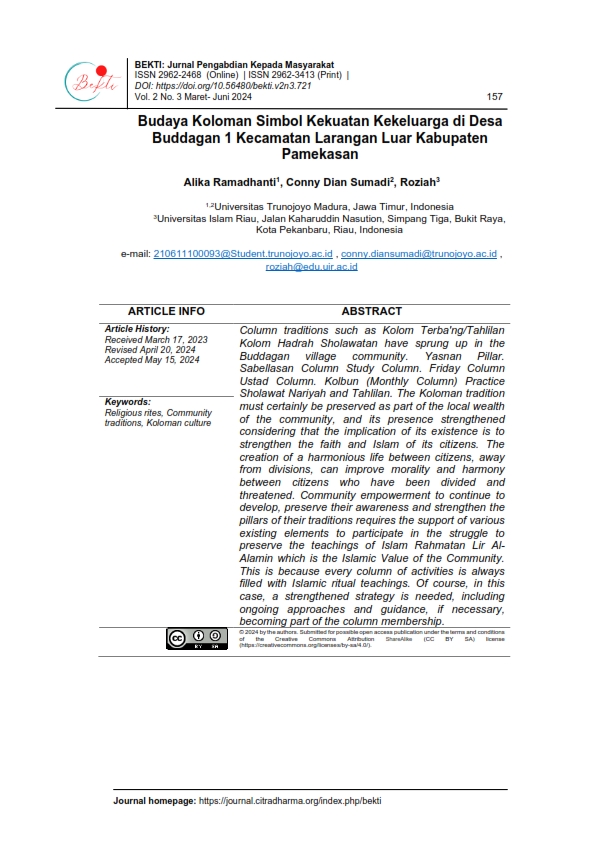Budaya Koloman Simbol Kekuatan Kekeluarga di Desa Buddagan 1 Kecamatan Larangan Luar Kabupaten Pamekasan
DOI:
https://doi.org/10.56480/bekti.v2i3.1321Keywords:
Religious rites, Community traditions, Koloman cultureAbstract
Column traditions such as Kolom Terba'ng/Tahlilan Kolom Hadrah Sholawatan have sprung up in the Buddagan village community. Yasnan Pillar. Sabellasan Column Study Column. Friday Column Ustad Column. Kolbun (Monthly Column) Practice Sholawat Nariyah and Tahlilan. The Koloman tradition must certainly be preserved as part of the local wealth of the community, and its presence strengthened considering that the implication of its existence is to strengthen the faith and Islam of its citizens. The creation of a harmonious life between citizens, away from divisions, can improve morality and harmony between citizens who have been divided and threatened. Community empowerment to continue to develop, preserve their awareness and strengthen the pillars of their traditions requires the support of various existing elements to participate in the struggle to preserve the teachings of Islam Rahmatan Lir Al-Alamin which is the Islamic Value of the Community. This is because every column of activities is always filled with Islamic ritual teachings. Of course, in this case, a strengthened strategy is needed, including ongoing approaches and guidance, if necessary, becoming part of the column membership.
References
Andang Subaharianto, dkk, tantangan Indusrialisasi Madura (Malang, Banyu media, 2004) Hlm., 51
Moleong, Lexy J. 1989, Metodologi Penelitian Kualitatif , Bandung : Remaja Rosda Karya.
Satori, D. (2010). Metode Penelitian Kualitatif. Alpabeta
Sugiono. (2016). Metode Penelitian Kualitatif, Dan R & D (Revisi). Alfabeta
Tentang Otentifikasi dan Pribumisasi periksa Edi Susanto, “Islam Pribumi versusIslam Otentik (Dialektika Islam Universal dengan Partikularitas Budaya Lokal)”, Karsa Jurnal Studi Keislaman Vol. XIII, No. 1, April 2008, hlm., 16-24
Effendy, M. P. (2023). Perspektif Guru di Pamekasan terhadap Permuseuman dan Kearifan Lokal Madura.
Sadik, S. (2014). Memahami jati diri, budaya, dan kearifan lokal Madura.
Majid, A. N., Muzakki, Z., & Amini, I. (2022). Harmonisasi Sosial Berbasis Kearifan Lokal Islami Dalam Masyarakat Tanèan Lanjâng Madura. Jurnal Asy-Syukriyyah, 23(2), 177-194.
Qomaria, N., & Tsulutsya, F. B. (2024). Pengembangan E-assessment Numerasi Konteks Kearifan Lokal Madura. JURNAL PENDIDIKAN MIPA, 14(4), 1153-1160.
Mukminin, A. (2021). Representasi kearifan lokal masyarakat Madura dalam bentuk Metafora pada lagu-lagu daerah Madura. NOSI, 10(1).
Utami, S., Widayati, W., & Tobing, V. M. L. (2022). Tradisi Lisan Kejhung Sebagai Sumber Pendidikan Dalam Penguatan Profil Pelajar Pancasila Berbasis Kearifan Lokal Madura. Jurnal Ilmiah Hospitality, 11(2), 671-676.
Lutfi, A., & Hidayatin, Z. (2023). Peran Bahasa Madura Dalam Meningkatkan Kearifan Lokal. Jurnal Lentera Edukasi, 1(2), 7-12.
Effendy, M. H., Maulidiawati, M., & Putikadyanto, A. P. A. (2022). Kearifan Lokal Madura Rokat Bhuju’Siti Rohana sebagai Alternatif Muatan Lokal Era Merdeka Belajar. GHANCARAN: Jurnal Pendidikan Bahasa dan Sastra Indonesia, 134-150.
Hamzah, M. (2022). Pencapaian Maqashid Syariah Dalam Kemajuan Ekonomi Masyarakat Madura Melalui Kearifan Lokal (Rokat Tase’). Al-Iqtishadiyah: Ekonomi Syariah dan Hukum Ekonomi Syariah, 8(1), 1-20.
Effendy, M. H. (2021). Nilai Religius pada Kearifan Lokal Tembang Macapat Madura. Khazanah Theologia, 3(1), 1-12.
Fabiana Meijon Fadul. (2019). Tanean Lanjheng. 1, 1–20.

Downloads
Published
Issue
Section
License
Copyright (c) 2024 Alika Ramadhanti, Conny Dian Sumadi, Roziah

This work is licensed under a Creative Commons Attribution-ShareAlike 4.0 International License.
Copyright Notice
Authors who publish with this journal agree to the following terms:
- Authors retain copyright and grant the journal right of first publication with the work simultaneously licensed under a Creative Commons Attribution-ShareAlike 4.0 International License that allows others to share the work with an acknowledgment of the work's authorship and initial publication in this journal.
- Authors are able to enter into separate, additional contractual arrangements for the non-exclusive distribution of the journal's published version of the work (e.g., post it to an institutional repository or publish it in a book), with an acknowledgment of its initial publication in this journal.
- Authors are permitted and encouraged to post their work online (e.g., in institutional repositories or on their website) prior to and during the submission process, as it can lead to productive exchanges, as well as earlier and greater citation of published work (See The Effect of Open Access).

This work is licensed under a Creative Commons Attribution-ShareAlike 4.0 International License.











